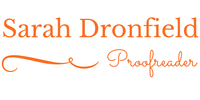|
You love the English language; you've always enjoyed reading; you've spotted errors in published books, or even seen ways in which the book could be improved – so, you think that maybe you could be a proofreader or a copy-editor. But where do you start? A surprising number of people think that, just because they were good at English at school and fancy having a go, it’s okay to ask established editors and proofreaders to pass work on to them. Um, no, that's not how it works – and it could be taken as quite an insult by someone who has spent years building up their skills and client list. There's a lot more to it than you might think; becoming an editorial professional is a long hard slog and requires a diverse set of skills in order to make a success of it. Instead, if you're really serious, here are some signposts you should follow. Go to a local group meeting of editorial professionals. This is a fantastic opportunity to seek advice (not work) from those who are already doing the job. It's a quick and easy way for you to find out whether this is a realistic option for you. In just an hour or two, with little or no cost involved – perhaps transport and a cup of coffee – you could discover whether you're suited to this kind of work, what's involved, plus you will have already begun to build your support network (believe me, you'll need one). This is an example of one such group. If you're in the UK, you can find your local group here. Still interested? Then join a professional organisation. In the UK, it’s the Society for Editors and Proofreaders (SfEP). You don’t have to live in the UK to join the SfEP, but here are some of the other professional organisations from around the English-speaking world: Ireland: Association of Freelance Editors, Proofreaders and Indexers (AFEPI) US: Editorial Freelancers Association (EFA), also, American Copy Editors Society (ACES) Canada: Editors Canada/Editors Association of Canada (EAC) Australia: Institute of Professional Editors (IPEd) Being a member of one (or more) of these organisations shows potential clients that you are a responsible professional, and each organisation usually offers its own set of benefits to help you on your way to becoming qualified and gaining experience. Get training. The SfEP offers training courses at a discount to members, which is just one of many good reasons to join sooner rather than later. An alternative provider in the UK is the Publishing Training Centre (PTC). There are other providers; however, with the SfEP and PTC you know you will be getting an industry-recognised qualification that will stand you in good stead if you hope to work with publishers and will also give you the skills you need to impress private clients. Don't give up the day job. If you already have a job, don't quit it thinking you will be up and running as a freelance editor or proofreader in no time. It usually takes a couple of years before newcomers have managed to build up a steady stream of income. How to find work, or how to get work to find you Set up a website. SfEP Internet Director, John Espirian, has excellent advice on how to do this. Make sure you list any specialist knowledge gained from a degree or work experience, or even a hobby. This is your unique selling point and could really help you in the early days. Market yourself. Don’t expect potential clients to just stumble across your website with no effort on your part. Set up a Facebook page, Twitter account and LinkedIn profile and use them to help direct people to your website by posting and engaging regularly. Start a blog. Louise Harnby offers a wealth of detailed marketing advice on her blog and in her book. Network. Don't just join a professional body, get involved – use the forums to get to know and learn from fellow editors and proofreaders, many of whom have decades of experience. You can also interact with other editors on social media. Don't expect anybody to just hand you work on a plate, but if you spend enough time with your colleagues you just never know what opportunities may come your way! What did I do? I began my journey three years ago and it's almost one year now since I started my proofreading business. I did all of the above, although not necessarily in that order – my first step was to do the training. Not everyone will follow exactly the same path to a career in editing – you have to take the route that’s best for you – but I strongly recommend stopping off at all of these points and definitely undertaking some training before attempting to find paid work. And remember this: there are no shortcuts if you want to be taken seriously by better-paying clients. If you follow the above signposts, you should have a much more successful journey and reach your planned destination without getting too lost along the way!
4 Comments
31/3/2017 01:19:46 pm
Very useful. Have done or doing all of the above. Thanks.
Reply
Sarah Dronfield
31/3/2017 01:38:10 pm
That's great, Annie. Glad you found it useful. Good luck with whatever you have left to do! (Although, of course, it never ends – CPD is very important in this game!)
Reply
Sarah Dronfield
31/3/2017 01:42:16 pm
And, by the way, I already knew you had been networking, because I recognised your name straightaway! :-)
Reply
Helen
29/7/2019 04:54:57 pm
Thank you so much for writing this informative post. I’m just beginning to think about working as a proofreader and these steps will be invaluable.
Reply
Your comment will be posted after it is approved.
Leave a Reply. |





